There was a children’s table in the corner of my room made from birch, produced in the Russian style of Khokhlama. The desert heat outside amplified the strong and distinct smell of the wood adorned with berries, leaves, flowers, and other provincial motifs painted on its surface in the traditional combination of red, gold, and black. A matching chair slid comfortably under the table, next to my tapochki - the fur-lined house slippers all children had to wear.
That was my writing desk when I was four and the bubble that enveloped me as I hunched over for hours, drawing, writing, and painting. I would run to the kitchen after each completed page, pigtails bopping along, to show my mother the work I’d produced.
I had no shortage of ideas, taping together little multilingual books and magazines - complete with illustrations - and distributing them to friends and neighbours. My tales had princesses and monsters, of course, along with farmers, sea creatures, hedgehogs, and toadstools. I read several of these stories aloud in class and during assemblies. My mother saved the notebooks and loose drawing sheets that housed my imagination, while my father kept report cards and only the works published in the school yearbook.
***
Language is safety. It builds a home for you to live in that is populated by everyone who speaks, thinks, or feels in it. The ability to mimic a dialect or comprehend local subtleties quickens integration, which can be crucial to survival.
Language is power. Possessing more than one opens up new realms, where superpowers like teleportation and invisibility are on offer.
Language is art. Deft manipulation of language allows for the translation of the human experience in all its nuance and complexity. There is rhythm, logic, and sequence, the mastery of which allows for the injection of emotions that bring life to words that are otherwise static.
***
In middle school, the topics shifted to serious ones - considerably so. I shadowed a journalist who occasionally taught at the school as part of my extracurricular activities, and sometimes accompanied her to the newspaper office. She was the only reporter in the Kingdom to cover honour crimes and femicide; a phenomenal navigator of murky topics. She wouldn’t have been able to continue bringing these horrors to light had she not measured each word carefully. There was wisdom in adhering to strict norms and boundaries regarding acceptable terminology that kept her employed, out of prison, and in some cases, alive.
Some of that grim material made its way to my notebooks. I was a foreigner in a foreign land where these crimes happened, but were rarely discussed, and I needed to understand how fathers and brothers could act upon unfounded rumours by drowning their daughters and sisters. My parents grew concerned over this newfound interest in such atrocities. Still, we made an agreement: as long as my grades stayed above 95 per cent in each class, I was permitted to continue. I began writing about different sorts of princesses and the monsters who went after them. The illustrations were replaced by photographs.
My future profession at the time seemed clear, to me at least: I was going to be a journalist and a translator simultaneously, bridging cultures and putting to good use the languages that I was learning.
***
Language is a prison when weaponized and used against those without the privilege to dwell on the shape of words and their meaning. Unsurprisingly, enslaved people who were literate and educated women were historically hunted down and punished. These days, millions are forcibly confined to a limited world lacking the very definitions that could set them free of their own communities, genders, and religions.
***
The student placement examination (administered by the province’s Ministry of Education) was brief. It was designed to match a new (immigrant) student to an appropriate grade, regardless of age or preference. The evaluators focused on mathematics, science, and English. They followed the standard curriculum taught in public schools (province-funded, not the private institutions referred to as “public” in the UK). I was bumped up two years to grade 11 and was automatically enrolled in that year’s Creative Writing course for the necessary English credit. Believing in the universality of a language’s grammar and syntax, I naively welcomed the idea of spending the remaining two months of the school year writing prose and exploring the authors of this country.
Receiving a C in Mrs. C’s (actual initial) class that first semester in Canada stung. My standing as an A student was part of my identity, and the Ministry of Education clearly marked me beyond the picking apart of this meanie. On the first essay I handed in, the commentary she left on the paper was confusing. “Poor structure. No form. See me.” Mrs. C argued that I hadn’t followed the typical introduction-body-conclusion way of writing essays. My subpar paper started with the punch line, working its way back into the details. I couldn’t wrap my head around that critique. I believed the “creative” part of that class was in the manner of narration. I let this one go.
The next essay was to be based on someone who we admired. What else can you expect from Mrs. C by way of prompts, if we’re being at all honest?
I chose Anna Akhmatova. A poet and literary figure that was banned by Stalinists. It wasn’t a life of ease, with her last partner shipped off to the Gulag. Still, she wrote. I don’t remember the details of my essay beyond the theme: standing up for what you believe needs to be said and sharing your work without fear.
“What is this?!” wrote Mrs. C in the margins, right underneath the C- in red, circled twice.
I stuck to math, history, and the sciences for the following semesters. Navigating a new country, an upended lifestyle, and uncertainty about the future didn’t leave me with a strong desire to fight over artistic interpretations.
***
Mass illiteracy in developed nations is a choice that looks like funding cuts to publicly supported educational institutions, disinvestment in libraries and art programs, and over-saturation of mind-numbing content on every digital surface.
***
University writing was formulaic. The first two years consisted of interpreting charts and graphs, and shading multiple-choice bubbles. The following year involved a series of proposals to fictitious companies and financial audits of existing corporations. Except for three papers on the ethics of commerce, the last year was dominated by the almighty PowerPoint - where creativity takes on a performative shape.
I didn’t go for a journalism degree if that remains unclear. There was no income to be made in the media; this was the onset of the “content should be free” era, and newspapers were folding fast. Economic security was paramount for my remaining family. A practical degree and gainful employment were the goal, especially since I graduated during the Great Recession.
Work followed. The skill of writing was one of my offerings, but my voice was not hired. Clever marketing copy, unrelenting calls to action, and 140-character bursts of whimsy brought unique opportunities and promotions. I found avenues for some of my writing to take shape under the guise of work, by volunteering to create and publish marketing products - usually magazines and newsletters. But the editorial and creative constraints proved too tiring.
I tried to hold on to what remained of my love of language and writing through a travel blog, documenting my escapes from a circumstance-imposed desk sentence. “It’s in your best professional interest to limit the amount of personality you have online,” shared a well-meaning higher-up. Responsibilities changed, and the passive voice was adopted. The only fiction I wrote then was confined to email. “We absolutely will meet that timeline.”
***
Losing your personal voice while being known as one of the most vocal and opinionated people in any room is a cruel cosmic joke. It’s a mute button you cannot lift with a space bar or a mouse click. You scream in your dreams and mentally compose prose in the shower, then sit at the table and wonder if you ever really had anything interesting to say.
***
A friend gifted me a Moleskine journal, along with a jar of ink and tequila. It was his way of nudging me to write, as we had that in common - except he actually wrote and published, and I didn’t. The first few pages of that journal noted the date and had one or two lines about an occurrence. That was it. The gaps between the dates showed that I had returned to the notebook every month, only to have nothing come out.
It wasn’t fear of the blank page; it was a sad realization that my words had left me. They scurried away, seeking shelter and hoping to have a future through other people: colleagues who used my uncredited work, supervisors who shredded drafts beyond recognition, and clients who paid by the post.
The height of irony came when I was teaching students at a local college how to create successful and authentic brands based on their distinguishable and unique voices. “Make it personal.”
***
Timing is everything. In language, a memorable quote is one that is inserted in exactly the right spot as the narrative flows. When it hits, it punches, leaving you momentarily breathless.
In diplomatic affairs declarations are impeccably orchestrated, with timing playing the critical part. It matters when something was said and to whom. Jumping ahead or delaying a pronouncement can carry severe consequences on a global scale.
With life, the meaning of certain events becomes clear when we understand not only the why, but also the significance behind the when.
***
I accepted the departure of my lexicon in all of the languages that once empowered me and picked up a watercolour brush instead. The only writings in the journal were numbers that followed “August”, “May”, and the ten other ones. Inside, drowned papers housed quick drawings of my solitary lunch-hour views, a series of anthropomorphized animals going about their work days, and surreal landscapes that were - in hindsight - representations of my fears and anxieties.
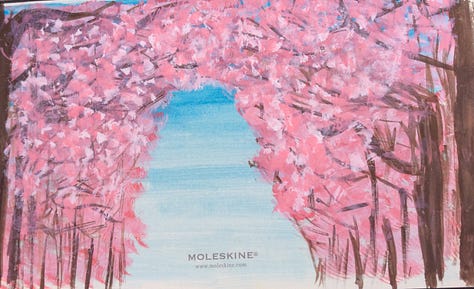
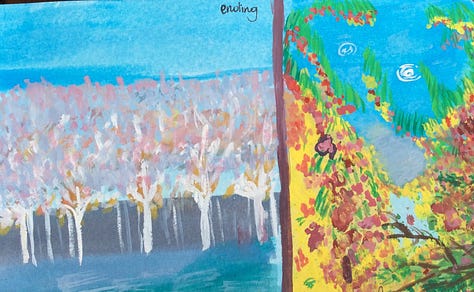
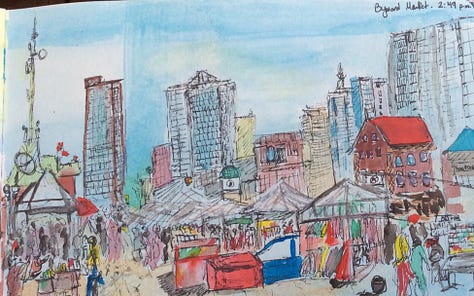
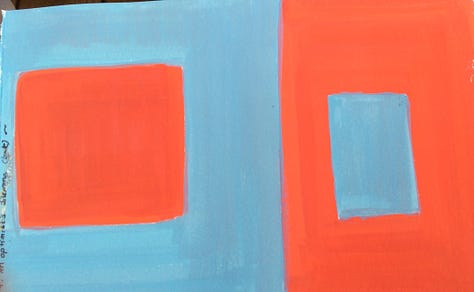
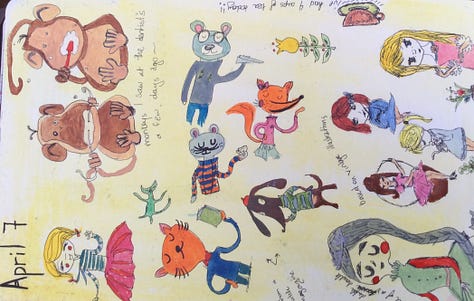
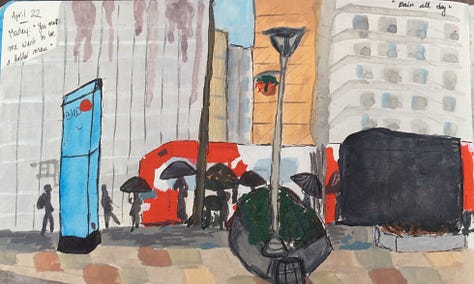
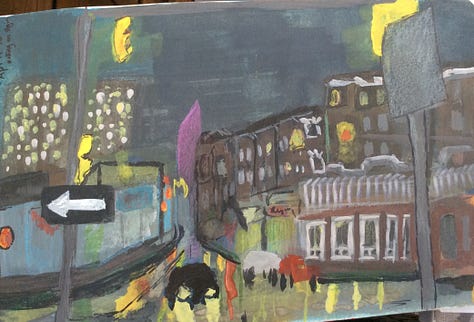
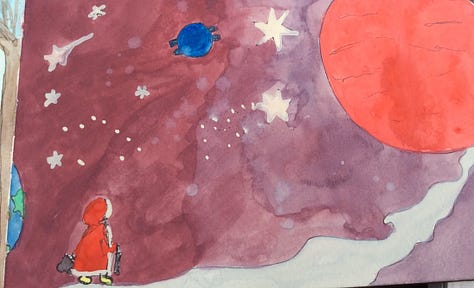
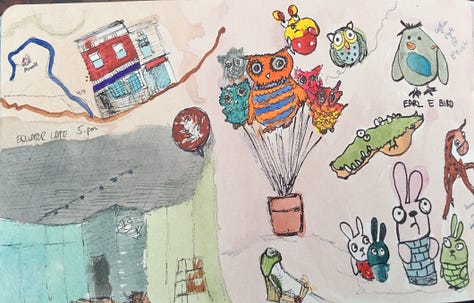
The illustrations continued for several years, wet and crunchy notebooks piling up on the shelf, harbouring the shapes and colours that made up my days. I can trace the lines of my drawings and tell you which strokes happened during happy times, which curves outlined when I broke my heart into a thousand shards, and which swirls wrapped around early signs of a physical state whose pain I am only now starting to accept as mine.
***
Words matter, goes the saying. I offer my addendum: Understand the heaviness of words.
Healing can be found in the calculation of the individual weight we ascribe to the words that have a grip on us. Ask someone what they imagine the physical mass of the word “freedom” to be. The greater the number, the more likely they experienced a lack of freedom at one point. Try again with “love” and see if you can spot who flinched, revealing how desperate they are for it.
Words hit really hard when they matter. You can carry the heavy ones daily, leaving little room to inhale deeply or take on anything else. You could cast them aside entirely or assign them a lighter value, then watch as they eventually fly away, like a helium-filled balloon.
***
A few Januaries ago, I awoke in the middle of the night and couldn’t fall asleep again for several days. I had no space left to bury memories, ideas, and emotions. The watercolours carried me thus far, but I ran out of colour combinations to explain how today felt lavender, but yesterday was beige. I longed for precise terminology to express the internal upheaval I was experiencing. Was I angry, livid, irate, seething, or just miffed on a given day? I couldn’t tell; it was all a foggy mess. I had been out of the business of processing sentiment for years. Decades. I could not discern what was my truth and what was The Truth. I felt a lump stuck in my throat when I tried to share something that went beyond the superficial. Perhaps the words didn’t run away. Maybe the accumulation of words in multiple languages compounded by unorthodox experiences morphed into some shape that could not pass through. The words were stuck. Like me.
Stuck really sucks.
***
Talking doesn’t have to be revealing; it’s fleeting. You can talk in circles without sharing how you genuinely think or feel. Writing, too, can be intentionally vague, abstract, and loaded with detours. But once the words are out there, visible on a page and available for interpretation and analysis, your subconscious is on full display.
Writing unravels you.
***
I set on getting unstuck using Julia Cameron’s way. Three morning pages each day. Every single day. The three may have contained plans for the day, a calligraphed repeat of the same sentence - perhaps an intention or affirmation, a book summary, or absolute drivel. Any damn thing, as long there were three pages of freestyling. No grades, calls to action, or executive approval. Unfiltered honesty between two leather covers. That was the deal for a year.
***
“It is a joy to be hidden and a disaster not to be found.” D. W. Winnicott
***
There is a table in the middle of my study encircled by wraparound bookshelves. The wooden top is made by a young local carpenter, and has a sizeable amount of red, black, and shimmery ink stains owing to my clumsy refilling of pens. I call these colourful droplets “inkcidents”. The table’s legs are electrically wired, moving up and down to produce a sit/stand work environment. Stuck to them is a collection of Post-its with scribbles and half-baked ideas that are procreating while I sleep. I don’t have tapochki under the desk, but I have a Henry who insists on placing himself between my feet, warming them up better than any fur-lined slipper.
Atop the table rest two laptops: one for the day job and one for soul work. And somewhere in the house is a folder that travelled across the Atlantic Ocean twenty-some years ago in one of the only three suitcases we brought. It contains a few of my childhood writings and drawings that my mother kept.





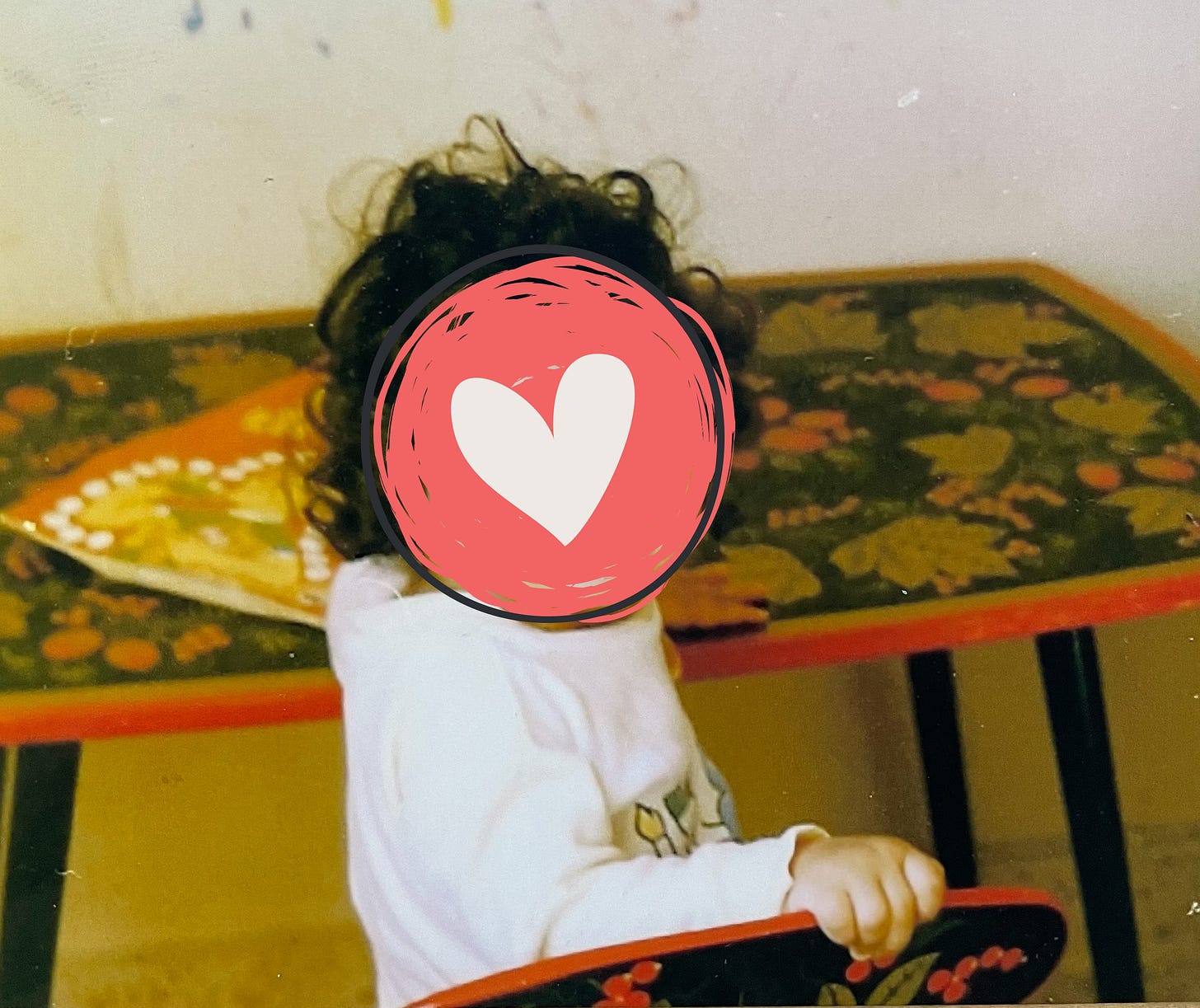
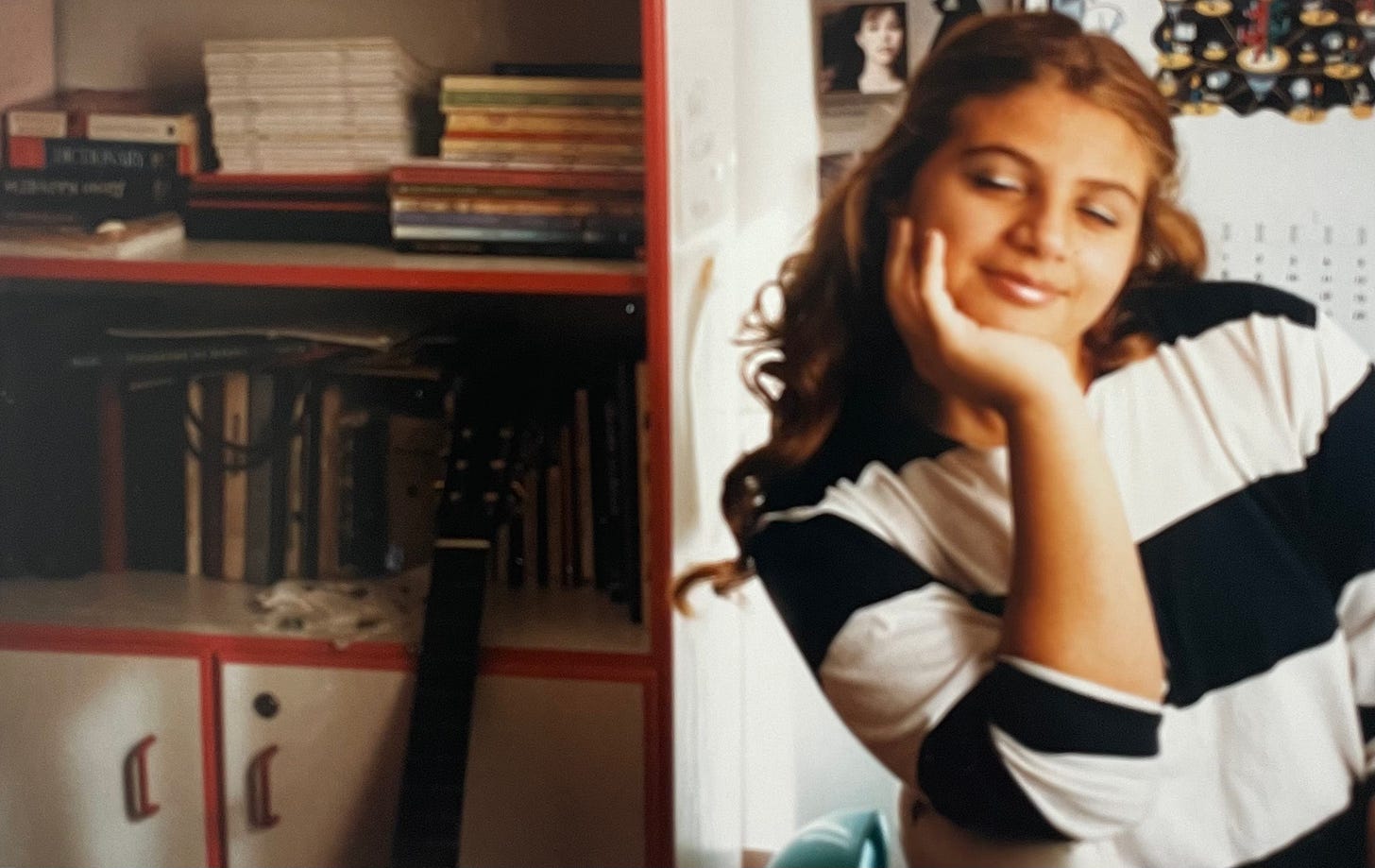
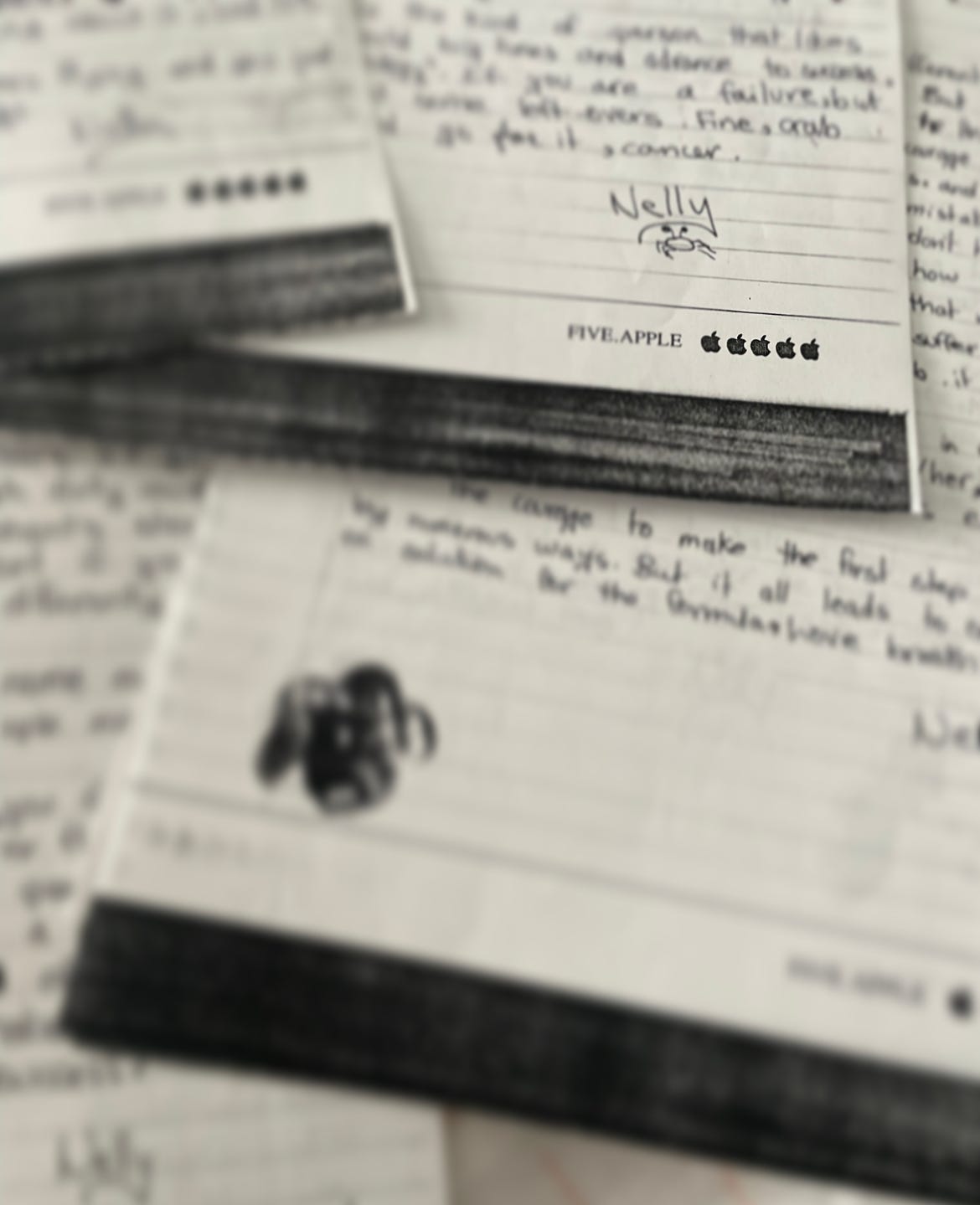
Beautiful. Keep braiding.
And can so relate regarding what happened to journalism
Amazing! Definitely a post to save and return to for its depth.